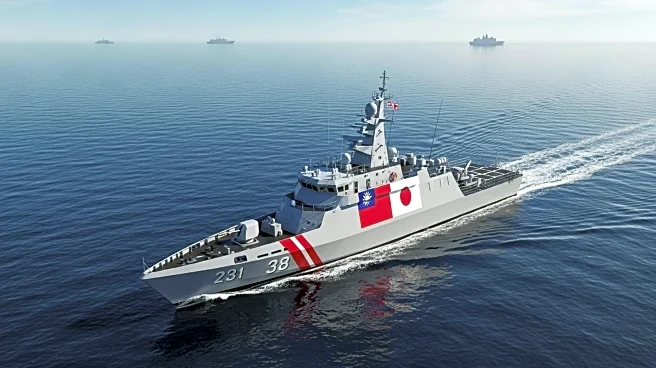What is the story about?
What's Happening?
Japan and Taiwan have conducted joint coast guard training exercises amid rising tensions with China over territorial disputes in the South China Sea and the Indo-Pacific region. The exercises, which took place off the Sakishima Islands in Japan's Okinawa Prefecture, involved a simulated search-and-rescue operation. This marks the second such drill since Japan severed diplomatic ties with Taiwan in 1972. The training is part of a broader effort to normalize maritime cooperation between Japan and Taiwan, both of which are closely aligned with the United States. The exercises come as China has increased its coast guard activities near Taiwan-administered areas and the Japan-controlled Senkaku Islands, which China claims as its own. The move is likely to provoke China, which opposes official exchanges between Taiwan and other countries.
Why It's Important?
The joint training exercises between Japan and Taiwan underscore the growing security cooperation in the region, which could have significant implications for regional stability. As both countries are key partners of the United States, their collaboration may strengthen U.S. influence in the region but also risk escalating tensions with China. The exercises highlight the strategic importance of the South China Sea and the Indo-Pacific region, where territorial disputes have long been a source of conflict. For Japan and Taiwan, enhancing maritime security is crucial to countering China's assertive actions. The situation could impact international trade routes and regional security dynamics, potentially drawing in other nations with vested interests in maintaining freedom of navigation and regional stability.
What's Next?
Japan's recent election of Sanae Takaichi as prime minister, known for her nationalist stance, suggests that security cooperation with Taiwan is likely to continue and possibly intensify. This could lead to further strain in Japan-China relations. Japan plans to bolster its maritime surveillance capabilities by acquiring new patrol ships and drones, indicating a long-term commitment to countering Chinese activities in disputed waters. Taiwan, on its part, has vowed to challenge Chinese incursions into its controlled waters, signaling ongoing tensions. The international community will be closely watching these developments, as they could influence broader geopolitical alignments and security policies in the region.
















